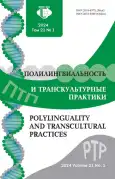Drevin and Slutsky: The Context of One Poem
- Authors: Shafranskaya E.F.1,2
-
Affiliations:
- Smolensk State University
- Moscow City Pedagogical University
- Issue: Vol 21, No 1 (2024)
- Pages: 144-153
- Section: LITERARY SPACE
- URL: https://journal-vniispk.ru/2618-897X/article/view/326952
- DOI: https://doi.org/10.22363/2618-897X-2024-21-1-144-153
- EDN: https://elibrary.ru/CGRFNI
- ID: 326952
Cite item
Full Text
Abstract
The study presents one of the analytical fragments of the Armenian text of Russian poetry. The corpus of “Armenian” texts includes the poem “The Builder of Paradise, the painter Drevin” by Boris Slutsky, which is outwardly unrelated to Armenia. The purpose of the article is to analyze the semantics of the poem’s context, in particular, its indirect connection with Armenia. The author solves a number of problems: characterizing the artistic work of Alexander Drevin and the role of Armenia in it, including writing an essay about the tragic biography of the artist; designation of Armenia’s place on the scale of values in the poetry of Boris Slutsky; characteristics of the Soviet image of paradise and its embodiment in art and literature. Using historical, cultural and biographical methods, the study reveals the Armenian subtext in the “non-Armenian” poem “The Builder of Paradise, the painter Drevin” based on the poems of Boris Slutsky and the archival file on charges of counter-revolutionary activities against Alexander Drevin (GA RF).
About the authors
Eleonora F. Shafranskaya
Smolensk State University; Moscow City Pedagogical University
Author for correspondence.
Email: shafranskayaef@mail.ru
ORCID iD: 0000-0002-4462-5710
SPIN-code: 5340-6268
Doctor of Philology, Professor, Leading Researcher at the Smolensk Center for Quantitative Philology, Smolensk State University; Professor of the Department of Philology, Moscow City University
4 Przhevalsky St, Smolensk, 214000, Russian Federation; building 1, 4 2nd Selskokhozyaystvenny Proezd, Moscow, 129226, Russian FederationReferences
- Amirkhanyan, M.D., Pavlova, L.V., and I.V. Romanova. 2020. Reconstruction of the «Armenian» Text in the Russian Poetry of the XX Century (Computer Research Experience), no. 2, pp. 5–21. https://doi.org/10.35785/2072-9464-2020-50-2-5-21
- Pavlova, L.V., and I.V. Romanova. 2020. “Armenian” text of Russian poetry (interpretation of data from the software package “Hypertext search for satellite words in author’s texts”). New Philological Bulletin, no. 4, pp. 212–225. https://doi.org/10.24411/2072-9316-2020-00103
- Pavlova, L.V., and I.V. Romanova. 2022. Blue color in the Armenian text of Russian poetry (interpretation of data from the software package “Hypertext search for satellite words in author’s texts”). Philological sciences. Questions of theory and practice, vol. 15, no. 12. pp. 3732–3738. https://doi.org/10.30853/phil20220653
- Pavlova, L.V., and I.V. Romanova. 2022. The “Color” component of the frequency dictionary of the “Armenian text”. Litera, no. 12, pp. 20–32. https://doi.org/10.25136/2409-8698.2022. 12.39276
- Pavlova, L.V., and I.V. Romanova. 2023. The consonance of Saryan and Armenia in the perception of Russian poets. Izvestiya Smolenskogo gosudarstvennogo unita, no. 1, pp. 5–18. https://doi.org/10.35785/2072-9464-2023-61-1-5-18
- Shafranskaya, E.F. 2022. Armenian text: poems and prose. Philological Sciences. Scientific reports of the higher school, no. 56, pp. 135–143. https://doi.org/10.20339/PhS.6s-22.135
- Andreev, S.N. 2023. Parameters of the Armenian text heat and cold: quantitative analysis. Quantitative linguistics, no. 10, pp. 4–12.
- Ginzburg, L.Ya. 1982. Private and general in a lyrical poem. L.Ya. Ginzburg. About the old and the new: Articles and essays. L.: Soviet writer, pp. 16–42.
- Sil’man, T.I. 1977. Notes on lyrics. L.: Soviet writer, 223 p.
- Krzhizhanovsky, S. 1931. Poetics of titles. Moscow: Nikitinsky subbotniks, 36 p.
- Shafranskaya, E.F. 2021. Butovsky polygon vs Nukus Museum named after I.V. Savitsky. Znamya, no. 7, pp. 180–205.
- From formalism to living life. 1934. Creation, no. 4, p. 15.
- Mjasina, M.B. 1973. The oldest Soviet artists about Central Asia and the Caucasus. Moscow: Soviet Artist, 285 p.
- Shafranskaya E.F., and Dolzhikova A.V. 2024. Karl Schmückle is unknown companion on the Tuvan journey of Otto Menchen-Helfen. New Research of Tuva, no. 1, pp. 135–147. (In Russ.). https://doi.org/10.25178/nit.2024.1.9
- Kubat’jan, G. 2019. One of the two hypostases. The Armenian theme in the poetry of Boris Slutsky. Friendship of Peoples, no. 6, pp. 238–249.
- Boldyrev, Y. 1987. Boris Slutsky. Literary Armenia, no. 11, pp. 33–34.
- Shafranskaya, E.F. and Sh.R. Keshfidinov. 2023. Armenian transit: artists as a pattern of Armenian text in Russian literature. Volga Pedagogical Search, no. 2, pp. 123–134.
Supplementary files









